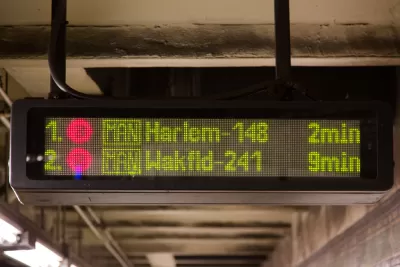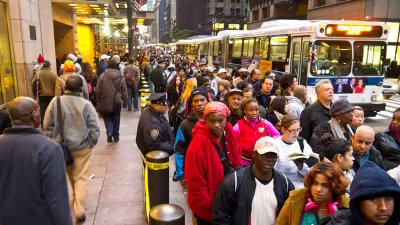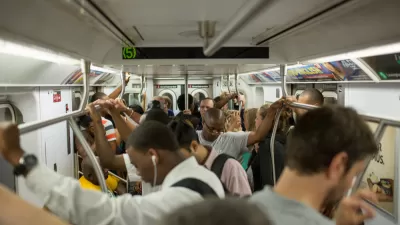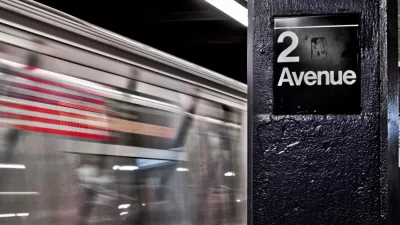Real-time arrival clocks have been in operation on New York's numbered subway lines since 2006, but they'll soon be on the way for lettered lines as well.

In the commuter driven world of New York City, a simple technological advancement like estimated real-time arrival information is a big change for the city's subway lines, according to an article by Oscar Perry Abello. How much will it mean to New Yorkers, however, is the question Perry Abello investigates.
Given many New Yorkers' devotion to habit and routine, according to Perry Abello, "it’s hard to imagine the extent to which real-time train arrival information displays will somehow stoke changes in New Yorkers’ lives so drastic as to alter where they live or how they get to work."
Perry Abello identifies some of the potential benefits of the arrival clocks, beyond the obvious. One of the key messages that the new clocks send to riders: that the MTA keeps its promises—even years after the promises were made.
FULL STORY: Countdown Clocks: What’s Real-Time Train Info to a New Yorker?

Planetizen Federal Action Tracker
A weekly monitor of how Trump’s orders and actions are impacting planners and planning in America.

Maui's Vacation Rental Debate Turns Ugly
Verbal attacks, misinformation campaigns and fistfights plague a high-stakes debate to convert thousands of vacation rentals into long-term housing.

San Francisco Suspends Traffic Calming Amidst Record Deaths
Citing “a challenging fiscal landscape,” the city will cease the program on the heels of 42 traffic deaths, including 24 pedestrians.

Defunct Pittsburgh Power Plant to Become Residential Tower
A decommissioned steam heat plant will be redeveloped into almost 100 affordable housing units.

Trump Prompts Restructuring of Transportation Research Board in “Unprecedented Overreach”
The TRB has eliminated more than half of its committees including those focused on climate, equity, and cities.

Amtrak Rolls Out New Orleans to Alabama “Mardi Gras” Train
The new service will operate morning and evening departures between Mobile and New Orleans.
Urban Design for Planners 1: Software Tools
This six-course series explores essential urban design concepts using open source software and equips planners with the tools they need to participate fully in the urban design process.
Planning for Universal Design
Learn the tools for implementing Universal Design in planning regulations.
Heyer Gruel & Associates PA
JM Goldson LLC
Custer County Colorado
City of Camden Redevelopment Agency
City of Astoria
Transportation Research & Education Center (TREC) at Portland State University
Jefferson Parish Government
Camden Redevelopment Agency
City of Claremont





























